Types Of Driveways – Pros, Cons, Cost & Maintenance
All types of driveways have a practical purpose, and choosing the right material for your drive requires careful consideration. From cost and climate to maintenance and drainage, many factors will influence your driveway surface options. But remember, your driveway is the first expression everyone gets about your home, so you should concentrate on installing strong, durable, and environmentally friendly driveways.
Driveways are made from brick, concrete, basalt, asphalt and glass. These materials are crafted into various pavers that can make a resounding statement on your landscape. Before installing any driveway type, you must consider your budget and the effectiveness of your chosen paving material. While asphalt driveway is cost-effective, glass driveways give a better aesthetic appeal to your curb. All these driveways have their pros and cons, but what matters is building your dream driveway.
The right driveway will save you money and improve the value of your property. This article helps you discover the different types of driveways available, their cost, benefits and how to clean and maintain each drive. Let’s dive right in!
As Home designs keep evolving, driveways become varied day by day. There are many types of driveways you can think of when considering a driveway project. These driveways include concrete, asphalt, stone slabs, bricks, gravel, grass and permeable driveways. To choose the best driveway, you should be able to communicate to your driveway contractor about your driveway plans; you will also need to go over some factors like your location and the size and shape of your driveway. Can you
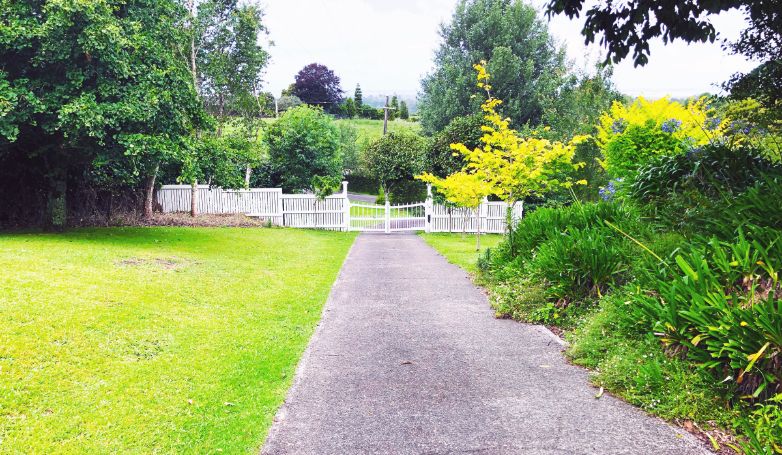
9 Best Types Of Driveways To Choose From
Driveways are the welcome mat of every property. You will need to make a driveway choice that suits your home or business needs. Although there are different types of driveways your final choice requires an in-depth assessment of many factors like budget, maintenance requirements, environment etc. Let’s look at some of the best driveways available for you.
Tar and Chip Driveway
Tar and Chip is a type of driveway that is drop-dead gorgeous, durable and built the way roadways were designed 70 years ago. A tar and chip driveway is also known as a chip seal.
Pros
- Tar and chip driveway are durable. It can resist heavy metals and harsh weather conditions.
- Tar and Chip’s driveway is affordable compared to other driveways.
Cons
- Tar and chips have a rough surface and are not ideal for winter because they make removing ice difficult.
- There is a limited choice of color and texture available for this driveway.
Cost and Maintenance
- The cost of tar and chip driveway depends on factors like size, type of materials and installation processes.
- Tar and chip driveway do not require rigorous effort to maintain. Sweeping, sealing and filling in small cracks when seen is all you need to do.
Basalt Driveway
Basalt driveway is greatly known for its ability to withstand hard conditions and natural look. Talk about strong and beautiful types of driveways; basalt embodies such qualities and can last for over 50 years.
Pros
- Basalt driveways are durable and can withstand heavy traffic and extreme weather conditions while also providing a natural, aesthetically pleasing look to a property.
- Basalt driveway requires little activity to maintain. When you clean it occasionally, you are good to go.
Cons
- Water makes basalt driveways slippery and can cause slip-and-fall incidents.
- The installation process of the basalt driveway is difficult because of the rock’s weight and thickness.
Cost and Maintenance
- Maintenance is relatively easy. Using a broom, power washer and hose can get the job done.
- The cost of a basalt driveway depends on the size, location and accessibility. You will need to pay between $8 to $20 per square foot.
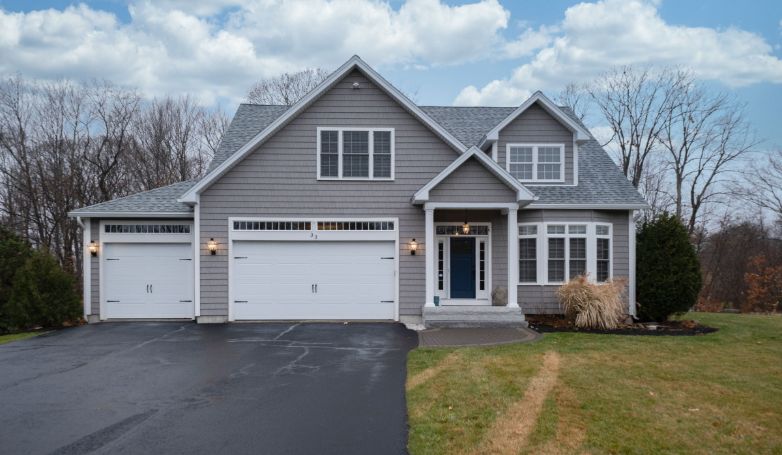
Asphalt Driveway
An Asphalt drivewayis a popular choice among homeowners who prefer a smooth surface. It is also the most common compared to other types of driveways. An asphalt driveway is made from cement, sand and crushed rocks.
Pros
- You can customize it to suit your preference, as it has vast options for color and texture.
- The installation process is easy. It will take you two days max to complete it.
Cons
- An asphalt driveway requires all hands on deck” kind of maintenance.
- Asphalt cannot withstand extreme heat as this will cost it to soften and damage.
Cost and Maintenance
- Asphalt costs an average of $3-$7 per square foot.
- Regular maintenance must be a top priority, such as sealing it every 3-5 years and fixing any cracks to prevent water damage. With proper maintenance, Asphalt can last 20 -30 years.
Cobblestone Driveway
If you like an old charm, cobblestone is your best choice. Even though this type of driveway can last for many years, too cold or too hot a climate can greatly affect it.
Pros
- Visually attractive and timeless
- It’s long-lasting and adds value to your property
Cons
- The installation process is expensive
- Its uneven surface can make it hard to remove snow with a shovel or plow.
Cost and Maintenance
- A cobblestone driveway costs around $25-$50 per square foot. Cobblestones can last decades.
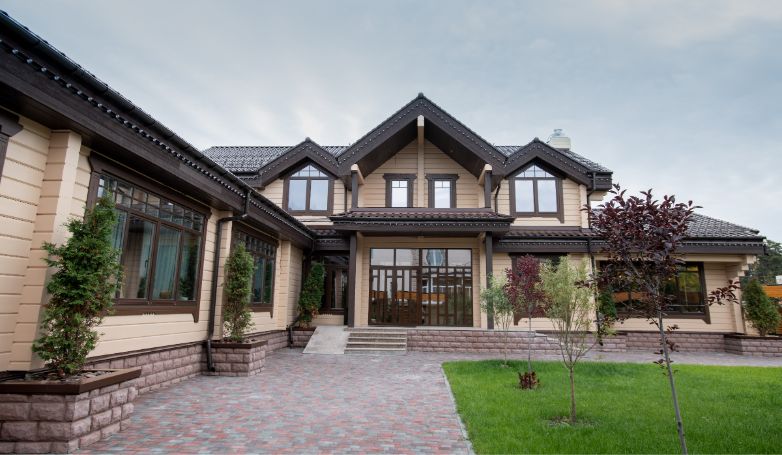
Brick Driveway
If you’re looking for different types of driveways that can withstand extreme weather condition, brick driveway is high on the list. This driveway is arranged in a pattern on the base of sand or gravel giving it a tough base for all weather.
Pros
- Environmentally sustainable
- It’s Long lasting with proper maintenance
Cons
- It doesn’t go well with water as it makes it slippery
- It’s expensive compared to other driveway materials
Cost and Maintenance
- It costs between $10 and $30 per square.
- Frequent sweeping, washing and sealing of bricks are important. It can make it last up to 25 years.
Paver Driveway
Pavers add to your home’s curb appeal and increase the value of your property. They are not as durable as concrete, but they have significant benefits.
Pros
- It gives a warm and luxurious appearance
- Stone pavers come in different styles and colors.
Cons
- Stone pavers are more costly. It will cost you thousands of dollars to pave a large driveway.
- Paver has a permeable surface and allows running water to infiltrate underneath it.
Cost and Maintenance
- Stone paver installation costs between $10-$15 per square foot.
- Pavers need to be cleaned regularly and sealed to avoid staining.
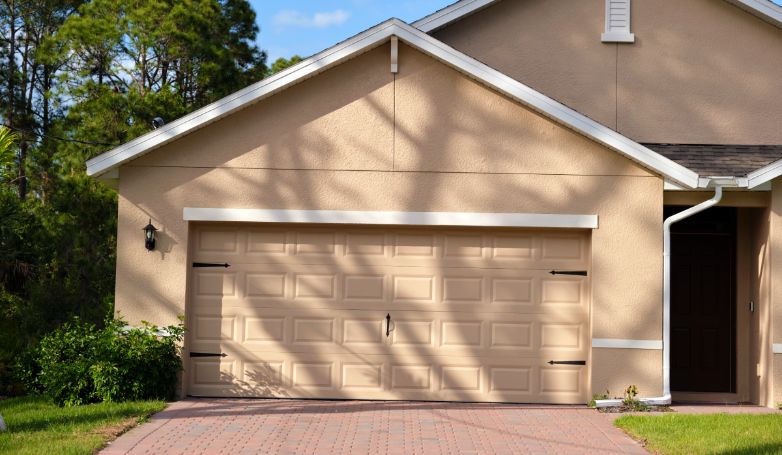
Concrete Driveway
Concrete driveways are made from durable materials that can withstand extreme weather conditions. It comes in different colors, styles and aesthetically appealing patterns.
Pros
- Concrete is a durable paving material lasting about twenty-five to fifty years if installed and maintained properly.
- Concrete is summer and winter friendly.
Cons
- If you are looking for a DIY paving project, then concrete isn’t the paving material you need.
- Installing concrete is costly and does require routine maintenance and sealing regularly.
Cost and Maintenance
- Installing a concrete driveway will cost you $4-$8 per square foot. Also, ensuring long-life concrete requires animal sealing and regular cleaning and maintenance. This makes it last 30 years or more.
Gravel Driveway
A gravel driveway allows for effective drainage of water. Unlike concrete and asphalt, which may take days to install, gravel takes a few hours or a day and can last up to 10 years. Gravel beat other types of driveways if you want to consider a DIY project.
Pros
- Gravel is very affordable
- You can always replenish your gravel driveway
- With extra gravel, you can fix potholes
Cons
- Difficult to clean
- They can easily wash away
Cost and Maintenance
- It costs $1-$3 per square foot to install a gravel driveway.
- Gravel driveway requires routine maintenance; these include grading your gravel driveway and directing water away from the gravel driveway.
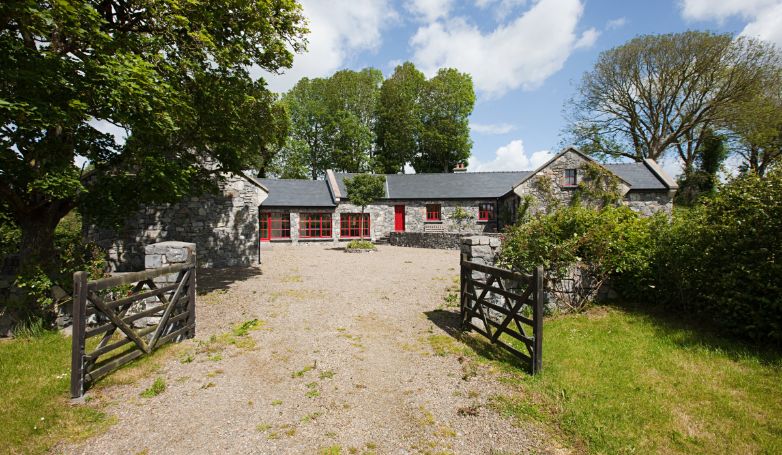
Crushed Stone Driveway
If you are looking for driveway material that’s cheap and quick to install, and durable, crushed stone is the best choice for your homes and business. They come in different colors, and they pair perfectly with any home style or landscape.
Pros
- Crushed stones or gravel is durable, and it’s environmentally friendly.
- They offer a simple style, and they are easy to install.
Cons
- Crush stones can get wiped out by heavy floods or storms.
- If the driveway is not properly installed, it can scatter or get crushed into dust with time.
Cost and Maintenance
- Crushed stones require regular and extensive maintenance to stay for decades.
- They cost an average of $1.50 – $2 per square foot to install a crushed stone driveway.
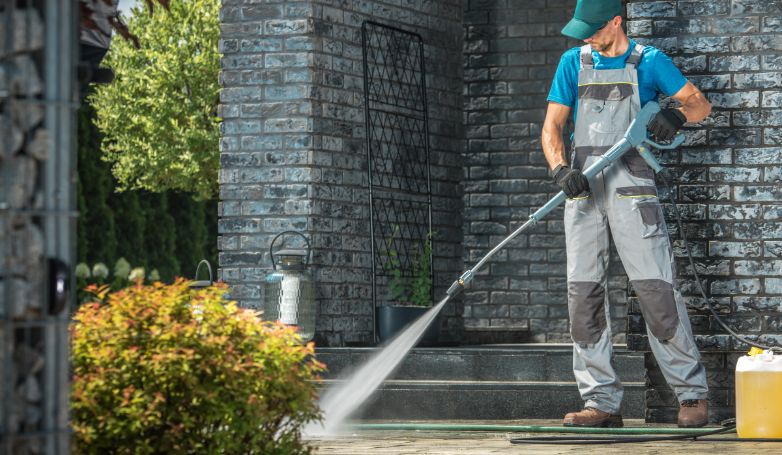
How To Preserve The Life Of Your Driveway
Preserving the life of your driveway is super easy, and the process is enjoyable. With the right cleaning and maintenance tools, you can preserve all types of driveways in five simple steps.
1. Wash it regular
Regular washing will help you get rid of dirt, dust, and fungi growth and kill off weeds from the surface of your driveway. It will also decrease the chances of driveway degradation and help you boost the integrity of your property.
2. Repair cracks as soon as they appear
Paving materials like concrete and asphalt crack when improperly maintained or exposed to excessive use and heavyweight. Ensure you repair cracks as soon as they appear
3. Do not allow water to infiltrate.
Flowing water contains pollutants, stains, dirt or pet waste that are unhealthy for your driveway surface and will cause damage or degradation with time. Ensure you don’t leave standing water on the surface of your driveway.
4. Protect them from the sun.
It’s important to protect the surface of your driveway by sealing or coating it. Sealers protect against weather damage and increase the likelihood of damage and pigmentation.
5. Do not use aggressive products.
Not all types of driveways can withstand harsh cleaning product. Although concrete driveways are hardwearing and can withstand some harsh chemicals. However, some other driveways’ surfacing materials will get destroyed when cleaned with the same product. It is always better to avoid aggressive cleaning products on any driveway surface.
Conclusion
Regarding the best types of driveways many choices are available for your home or business needs. However, most of these driveway types of materials require regular maintenance to preserve their integrity and increase your property value. Other driveway surface options include; tarmac, tiles, block, grass pavers, and permeable and porous pavers.

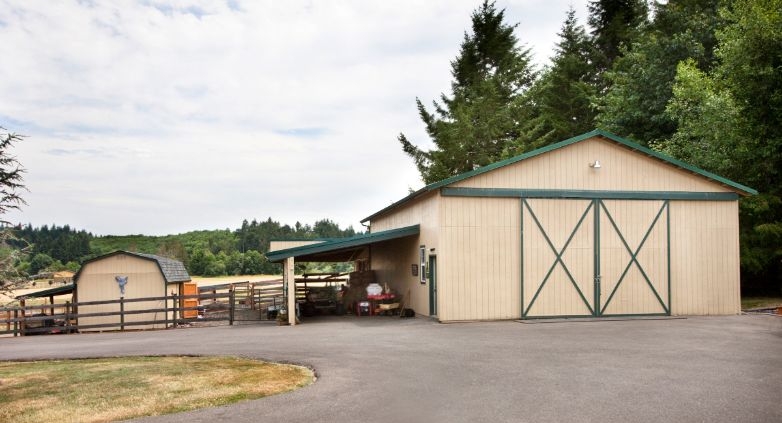

Leave a Reply
Want to join the discussion?Feel free to contribute!